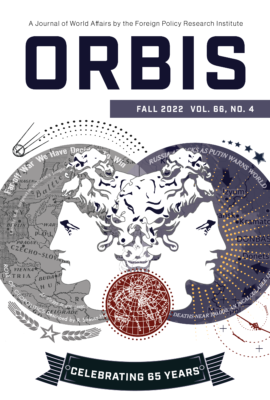A nation must think before it acts.
With this issue, Orbis completes its 65th year of publication. Its founder, Ambassador Robert Strausz-Hupé, wanted a publication that would focus attention and debate on the “key international issues on which the nation’s long-range future hinges.” In commemoration of that task, we have asked several former editors of the journal to offer their commentary.
Opening this special section of the journal, the president of the Foreign Policy Research Institute, Carol “Rollie” Flynn, engages the founding editor’s first article in the inaugural issue of Orbis as a jumping off point to demonstrate the continuing relevance of Strausz-Hupé’s vision—and how the judicious use of what he called “federative power” by the United States is a feasible strategy for American leadership of the global community of free nations in this century, as it was in the last.
Several recent editors of Orbis provide contributions that highlight a particular issue of interest or concern that they explored during their respective editorial tenures. Connecting to Flynn’s hope about revitalizing US leadership for a new century, Walter McDougall cautions us in terms of the nightmares of several failed interventions of the recent past–and lessons that can be learned for the future. David Eisenhower asks us to revisit the meaning of World War II—the catalyzing event for the United States to assume greater responsibility for the safe operation of the international system by breaking with its more isolationist past. Given the importance of projecting military power around the globe as the backstop to that “federative power,” Mackubin T. Owens revisits the civil-military bargains that are pivotal to the U.S. national security system—a set of arrangements that has also evolved and been altered significantly since Orbis began publication. Finally, considering the Russian invasion of Ukraine and the momentous choice taken by Sweden and Finland to forego formal neutrality for membership in the Atlantic alliance, James Kurth revisits the fraught debate over NATO’s eastern enlargement versus Russia’s desire to retain its traditional sphere of influence.
Strausz-Hupé founded Orbis in the aftermath of the Soviet invasion of Hungary and the dawn of the space age, as the world experienced what the World Economic Forum describes as the “Third Industrial Revolution” (featuring the use of electronics and information technology to enhance productive capacity). Sixty-five years later, this anniversary issue appears in the shadow of the Russian invasion of Ukraine and the disruptions caused by the “Fourth Industrial Revolution” (the arrival of the internet of things, synthetic biology and artificial intelligence). It is therefore appropriate to begin the journal’s second era by looking at the initial shockwaves caused by Moscow’s incursion into Ukraine, as well as how technology is changing the international chessboard.
Continuing a theme initiated in our special issue two years ago on emerging technologies and national security (Fall 2020), Robert Trager examines the security governance challenge, while Robert Kaplan, in conversation with Clint Watts, discusses how great power competition with Russia and China manifests itself in cyberspace.
The Russian invasion of Ukraine also has given us the first signs of how international affairs might change in the 2020s. Tatiana Serafin charts how the informational struggle has played out in favor of Ukraine, while Anna Mikulska speculates on how global energy patterns may change (both in terms of dependence on Russia as well as the shift to greener forms) because of Vladimir Putin’s decision to go to war. Judah Grunstein, in keeping with our focus on whether we are in a Zeitenwende (change of the age), wrestles with assumptions about globalization and interdependence in a time when decoupling (especially between the West on one side and Russia and China on the other) is in ascendance.
Finally, with major shifts occurring in Europe (regarding traditional neutrals choosing geopolitical alignments)—and with Switzerland itself showing more willingness to join in sanctions regimes, Mark Fox presents an overview of Switzerland’s own evolution as the neutral power par excellence.
When Orbis launched in 1957, the first steps in a new subfield of international relations—foreign policy analysis—were being taken in the academy–attempting to better understand the causes behind the national security decisions taken by governments around the world. The field is now expanding in new directions as we move beyond thinking of policymakers as indistinguishable carbon units. Rather, there is now a consideration of how a person’s sum total of experiences and identities—including gender—play a role in shaping assumptions about the world and proclivities for different policy options. Melissa Deehring and Joan Johnson-Freese, using the prism of US efforts to dissuade the Islamic Republic of Iran from crossing the nuclear finish line, argue that insights from a feminist theoretical approach that considers gendered responses might help create a more effective and sustainable deterrent.
As we finish one era of Orbis and begin a new chapter, the problems and issues that confronted us in the 1950s are still with us. Yet, as Flynn reminds us, the globalization that Strausz-Hupé foresaw has bequeathed us not only benefits but a new set of challenges. This is why Orbis “will curate the most insightful articles that examine the issues that affect global security.” In that, our mandate remains unchanged in 2022, as in 1957.





